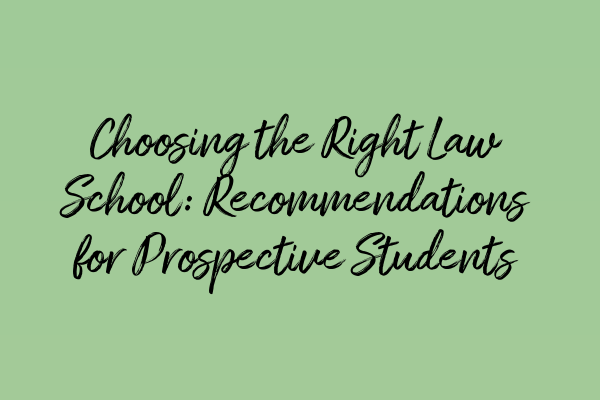Choosing the Right Law School: Recommendations for Prospective Students
Are you considering pursuing a career in law? If so, one of the most crucial decisions you’ll need to make is choosing the right law school. With the multitude of options available, it can be overwhelming to determine which institution is the best fit for you. However, armed with the right knowledge and guidance, you can make an informed decision that sets you up for success in your legal career. In this article, we will provide recommendations and insights to help prospective students choose the right law school.
Consider Location and Reputation
One of the first factors to consider when choosing a law school is its location and reputation. The location of a law school can have a significant impact on your overall law school experience, as well as future career opportunities. Additionally, the reputation of the law school can influence how potential employers perceive your qualifications.
For instance, if you’re interested in pursuing a legal career in a specific region, attending a law school in that area could provide you with access to local networking opportunities and internships. On the other hand, if you have ambitions of practicing law on a national or international scale, attending a law school with a strong reputation and alumni network can open doors and enhance your job prospects.
Evaluate Faculty and Curriculum
Another crucial aspect to consider is the quality of faculty and the curriculum offered. The faculty at a law school plays a vital role in shaping your legal education and can make a significant difference in the depth of knowledge and practical skills you acquire. Look for institutions with experienced professors who are actively engaged in legal practice or are renowned experts in their respective fields.
Additionally, evaluate the curriculum to ensure it aligns with your career goals and interests. Some law schools offer specialized programs or concentrations in specific areas of law, such as criminal law, corporate law, or international law. If you have a particular legal niche you wish to pursue, it’s essential to select a law school that offers relevant courses and opportunities to specialize in that area.
Consider Student Support and Resources
Support and resources provided by the law school can have a profound impact on your overall learning experience. When evaluating prospective law schools, inquire about the availability of academic advising, career counseling, and networking opportunities. These services can assist you in making informed academic and career decisions, as well as connecting with alumni and potential employers.
Furthermore, research the library facilities, moot court opportunities, legal research databases, and other resources that the law school provides. Having access to comprehensive resources and support can significantly enhance your legal education and prepare you for the challenges of a legal career.
Evaluate Costs and Financial Aid Options
Finances play a significant role in choosing a law school. Law school tuition and associated expenses can be substantial, so it’s essential to carefully evaluate the costs involved. Research the tuition fees, living expenses, and any other miscellaneous costs associated with attending each law school you’re considering.
Additionally, explore the financial aid options available, such as scholarships, grants, and loans. Many law schools offer scholarships based on merit, financial need, or specific criteria. Be proactive in seeking out and applying for financial aid opportunities to offset the financial burden of law school.
Visit and Connect with Current Students
Lastly, we recommend visiting the law schools you are considering, if possible, and connecting with current students. Visiting the campus allows you to experience the environment firsthand and get a sense of the overall culture and atmosphere. It also provides an opportunity to speak with faculty members, admissions personnel, and current students to gain insights and perspectives on the law school experience.
Take advantage of campus tours, open houses, and information sessions to gather as much information as possible. Additionally, try to connect with current students through social media or online forums to learn about their personal experiences and gain valuable insights into the strengths and weaknesses of the law schools you are considering.
Conclusion
Choosing the right law school is a critical decision that can shape your legal career for years to come. By considering factors such as location, reputation, faculty, curriculum, student support, costs, and connecting with current students, you can make an informed choice that aligns with your career goals and aspirations.
Remember, the decision to become a lawyer is not one to be taken lightly. It requires dedication, hard work, and a commitment to lifelong learning. Conduct thorough research, weigh your options, and choose a law school that provides the necessary tools and support to help you succeed.
Related Articles:
– Private Prosecutions: Exploring Non-Governmental Prosecutions in Criminal Cases
– Rights of the Accused: Protecting Individual Liberties in Criminal Proceedings
– Magistrates’ Court vs Crown Court: Understanding Key Differences
– Protecting Vulnerable Witnesses in Criminal Trials: Best Practices and Legal Safeguards
– Unraveling the Complexities of UK Bail Laws


Leave a Reply